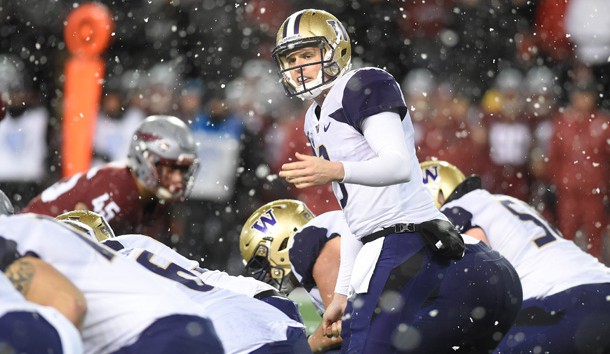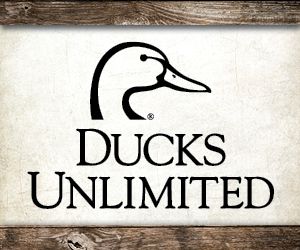
Nov 23, 2018; Pullman, WA, USA; Washington Huskies quarterback Jake Browning (3) goes under center during a football game against the Washington State Cougars during the first half at Martin Stadium. Photo Credit: James Snook-USA TODAY Sports
Pac-12 football holds a long-established reputation for producing high-scoring offenses and innovative schemes. The conference’s 2018 championship game on Friday, pitting No. 11-ranked Washington against No. 17 Utah, defies convention.
The Huskies (9-3, 7-2 Pac-12 Conference) and Utes (9-3, 6-3) come into Friday’s matchup at Levi’s Stadium boasting two of the stingiest defenses in the nation — and, for the first time in the Pac-12 Championship’s eight-year history, the top two scoring defenses in the conference.
“That’s how I think of championship football,” said Washington coach Chris Petersen. “Way back when I was an offensive coordinator (at Boise State), and we were winning a lot of games … I think it always comes down to defense.”
Petersen’s time as a head coach at Boise State garnered national championship with the implementation of trick plays and highlight-reel moments. But in both his tenure as Broncos offensive coordinator and later head coach, Boise State routinely featured some of the best statistical defenses in the country.
He brought the same approach taking over at Washington in 2014, with some of the same staff. Behind co-defensive coordinator Pete Kwiatkowski, who made the move with Petersen, the Huskies allowed just 17.7 points en route to a Pac-12 championship in 2016.
The 2018 defense has been even better to date, surrendering 16.5 points per game under the combined efforts of Kwiatkowski and Jimmy Lake. The Huskies defend the pass aggressively, thanks in part to a deep secondary with standouts like Taylor Rapp, JoJo McIntosh, Byron Murphy and Myles Bryant.
As good as Washington is against the pass (No. 25 nationally in yards allowed per game), it’s been better defending the run. The Huskies rank No. 20 in rushing yards allowed at 122.9, keyed by the nation’s leading tackler, linebacker Benn Burr-Kirven.
With a second Pac-12 championship in three years just a win away, Washington’s an embodiment of a simple Petersen philosophy.
“Really, really good football teams come down to great defense,” he said.
That may be, and this championship matchup supports the premise, but the Pac-12’s offensive reputation exists for a reason.
Not far from the site of Friday’s title tilt at Levi’s Stadium, the late Bill Walsh ran his acclaimed West Coast Offense at Stanford. Decades later, the first Pac-12 Championship Game played in the San Francisco 49ers new home featured Arizona and Oregon teams that scored 34.5 and 45.4 points per game.
Even Petersen’s 2016 Washington team ranked eighth nationally, scoring a blistering 41.8 points per game with key contributors still on the roster like quarterback Jake Browning and running back Myles Gaskin.
Meanwhile, a Utah program built on outstanding defense contended for Pac-12 championship opportunities three times in recent years, but ultimately fell short.
Utes coach Kyle Whittingham describes his coaching emphasis as “trying to turn teams one-dimensional with defense,” but credits Utah becoming a better offensive team for its first Pac-12 South title.
“Things are a little bit cyclical,” Whittingham said of two defensive-oriented teams taking the lead in a conference known for offense. “But the biggest thing, in my estimation, is the overall talent and ability of your team…not just one particular unit.”
Utah’s 30.8-point per game average this season is the program’s second-highest since joining the Pac-12 in 2011. The 2018 Utes offense is the most effective of the Pac-12 era, averaging 0.417 points per play, compared to 0.393 for the 2014 team that produced a slightly higher point-per-game output (31.3).
The Utes have come alive in the past two months, well removed from the seven points scored in a 21-7 loss to Washington on Sept. 15. Their 35-27 win over rival BYU to cap the regular season marked the seventh time in the Utes’ last eight game in which they scored at least 30.
Utah’s maintained this pace while starting a new backfield for the final three weeks, with redshirt freshman quarterback Jason Shelley filling in for Tyler Huntley, and running back Armand Shyne replacing Zack Moss.
Huntley broke his collarbone in a Nov. 3 loss at Arizona State, and Moss sustained a knee injury the next week in practice.
Both Shelley and Shyne have delivered since stepping into the starting lineup. Shyne rushed for 174 yards in a crucial, 32-25 win over Oregon on Nov. 10, and Shelley was instrumental in the fourth-quarter comeback against BYU.
His hurdle of a BYU defender to convert a key first down provided a spark in the decisive, 28-0 run.
Utah now takes its revamped offense and typically stingy defense into a long-awaited title showdown.
“Playing in a Pac-12 Championship is something we have had our sights set on,” linebacker Chase Hansen said in the postgame press conference. “We wanted the rivalry win, but we have had our sights set on next week’s game for a long time.”
While Utah’s offense seeks scoring opportunities that don’t come easily against Washington’s defense, the Utes No. 5 nationally ranked rushing defense must solve Huskies running back Gaskin.
Gaskin rushed for 143 yards in Washington’s September win at Utah, and completed the regular season with a 2018-best 170 yards and three touchdowns at Washington State.


